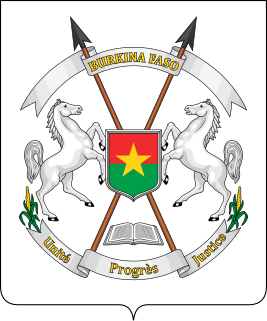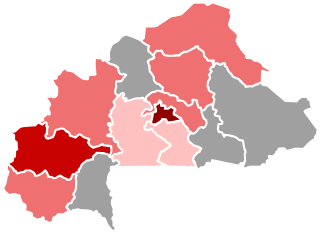| |||||
| Decades: | |||||
|---|---|---|---|---|---|
| See also: | |||||
Events in the year 2006 in Burkina Faso .
| |||||
| Decades: | |||||
|---|---|---|---|---|---|
| See also: | |||||
Events in the year 2006 in Burkina Faso .

Burkina Faso is a landlocked country in West Africa with an area of 274,200 km2 (105,900 sq mi), bordered by Mali to the northwest, Niger to the northeast, Benin to the southeast, Togo and Ghana to the south, and the Ivory Coast to the southwest. It has a population of 20,321,378. Previously called Republic of Upper Volta (1958–1984), it was renamed Burkina Faso by President Thomas Sankara. Its citizens are known as Burkinabè, and its capital and largest city is Ouagadougou.

This article is about the demographic features of the population of Burkina Faso, including population density, ethnicity, education level, health of the populace, economic status, religious affiliations and other aspects of the population.

The economy of Burkina Faso is based primarily on subsistence farming and livestock raising. Burkina Faso has an average income purchasing-power-parity per capita of $1,900 and nominal per capita of $790 in 2014. More than 80% of the population relies on subsistence agriculture, with only a small fraction directly involved in industry and services. Highly variable rainfall, poor soils, lack of adequate communications and other infrastructure, a low literacy rate, and a stagnant economy are all longstanding problems of this landlocked country. The export economy also remained subject to fluctuations in world prices.
Telecommunications in Burkina Faso include radio, television, fixed and mobile telephones, and the Internet.

Burkina Faso has good relations with the European Union, African and certain Asian countries. France, the former colonial power, in particular, continues to provide significant aid and supports Compaoré's developing role as a regional powerbroker.

Thomas Isidore Noël Sankara was a Burkinabé military officer, Marxist revolutionary, and pan-Africanist, who served as President of Burkina Faso from his coup in 1983 to his deposition and murder in 1987. Viewed by supporters as a charismatic and iconic figure of revolution, he is commonly referred to as 'Africa's Che Guevara'.

Dracunculiasis, also called Guinea-worm disease, is a parasitic infection by the Guinea worm, Dracunculus medinensis. A person becomes infected by drinking water containing water fleas infected with guinea worm larvae. The worms penetrate the digestive tract and escape into the body. Around a year later, the adult worm migrates to an exit site – usually a lower limb – and induces an intensely painful blister on the skin. The blister eventually bursts to form an intensely painful open wound, from which the worm slowly crawls over several weeks. The wound remains painful throughout the worm's emergence, disabling the infected person for the three to ten weeks it takes the worm to emerge. During this time, the open wound can become infected with bacteria, leading to death in around 1% of cases.
Events from the year 2007 in Burkina Faso.

A landlocked sub-Saharan country, Burkina Faso is among the poorest countries in the world—44 percent of its population lives below the international poverty line of US$1.90 per day —and it ranks 185th out of 188 countries on UNDP's 2016 Human Development Index .Rapid population growth, gender inequality, and low levels of educational attainment contribute to food insecurity and poverty in Burkina Faso. The total population is just over 20 million with the estimated population growth rate is 3.1 percent per year and seven out of 10 Burkinabe are younger than 30. Total health care expenditures were an estimated 5% of GDP. Total expenditure on health per capita is 82 in 2014.

Burkina Faso–India relations refers to the international relations that exist between Burkina Faso and India. Burkina Faso maintains an embassy in New Delhi. India maintained an embassy in Ouagadougou from November 1996 until its closure in July 2002. Currently, India maintains an honorary consulate in Ouagadougou, which functions under the jurisdiction of the High Commission of India in Accra, Ghana.

The COVID-19 pandemic in Burkina Faso is part of the ongoing worldwide pandemic of coronavirus disease 2019 caused by severe acute respiratory syndrome coronavirus 2. The virus was confirmed to have reached Burkina Faso on 9 March 2020. The death of Rose Marie Compaoré, a member of the National Assembly of Burkina Faso, on 18 March marked the first recorded fatality due to COVID-19 in Sub-Saharan Africa.
Events in the year 2013 in Burkina Faso.
Events in the year 2012 in Burkina Faso.
Events in the year 2010 in Burkina Faso.

Burkina Faso started vaccinating against COVID-19 on 2 June 2021.
Events in the year 2009 in Burkina Faso.
Events in the year 2008 in Burkina Faso.

An ongoing war and civil conflict between the Government of Burkina Faso and Islamist rebels began in August 2015 and has led to the displacement of 1.9 million people and the deaths of at least 2,000 civilians and combatants.

Islamist insurgency in the Sahel or Jihadist Insurgencies in the Sahel refers to the Islamist insurgency in the Sahel region of West Africa following the 2011 Arab Spring to the present day. In particular, the intensive conflict in the three countries of Mali, Niger and Burkina Faso has been referred to as the Sahel War.